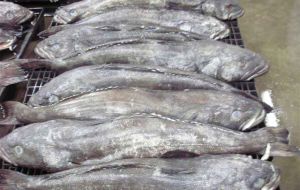MercoPress. South Atlantic News Agency
FAO admits illegal fishing remains major threat; calls for a global record of fishing vessels
 Valuable toothfish suffers from illegal, unreported, unregulated fishing
Valuable toothfish suffers from illegal, unreported, unregulated fishing Countries are making progress in implementing the Code of Conduct for Responsible Fisheries, which is now 15 years old, but still extremely relevant. However, additional efforts are needed, declared participants at the close of the 29th session of the FAO Committee on Fisheries.
The Committee said that the Code's principles must be more widely included in national policy, legislation and implementation. It encouraged a broader application of the ecosystem approach to fisheries and aquaculture, requesting that FAO provide countries with technical assistance, especially for the problems confronting the world's small-scale fisheries, including inland fisheries.
This was one of the largest Committee meetings, attended by 565 participants, including 115 Member States, specialized UN agencies and observers from over 70 intergovernmental and international non-governmental organizations.
The Committee recognized that illegal, unreported and unregulated (IUU) fishing is a major global threat to long-term sustainable fisheries, particularly to developing countries.
Noting the adoption of the 2009 FAO Agreement on Port State Measures, the Committee agreed that port state measures are a powerful and cost-effective tool in combating IUU fishing and welcomed the forthcoming FAO Technical Consultation on Flag State Performance.
It also gave its support to the development of a global record of fishing vessels, an online database to provide vessel-related information on fishing and support vessels - as another useful tool in the fight against illegal, unreported and unregulated (IUU) fishing.
During its week-long meeting, the Committee also adopted three sets of guidelines - on aquaculture certification, on the eco-labelling of fish and fishery product from inland capture fisheries, and on by catch management and reduction of discards.
Noting the important role of small-scale fisheries, which provides livelihoods for over 540 million people, the Committee asked FAO to prepare guidelines on small-scale fisheries, focusing on the needs of developing countries and complementing the Code.
Members also asked FAO to prepare a report on the extent of the implementation of the 1999 International Plan of Action for the Conservation and Management of Sharks.




Top Comments
Disclaimer & comment rules-

Read all commentsIllegal fishing crosses borders – so must law enforcement. Gunnar Stølsvik of the Norwegian ministry for fisheries writes about ways to combat IUU fishing:
Feb 18th, 2011 - 09:56 am 0http://www.cfp-reformwatch.eu/2011/02/illegal-fishing-crosses-borders-%E2%80%93-so-must-law-enforcement/
Commenting for this story is now closed.
If you have a Facebook account, become a fan and comment on our Facebook Page!